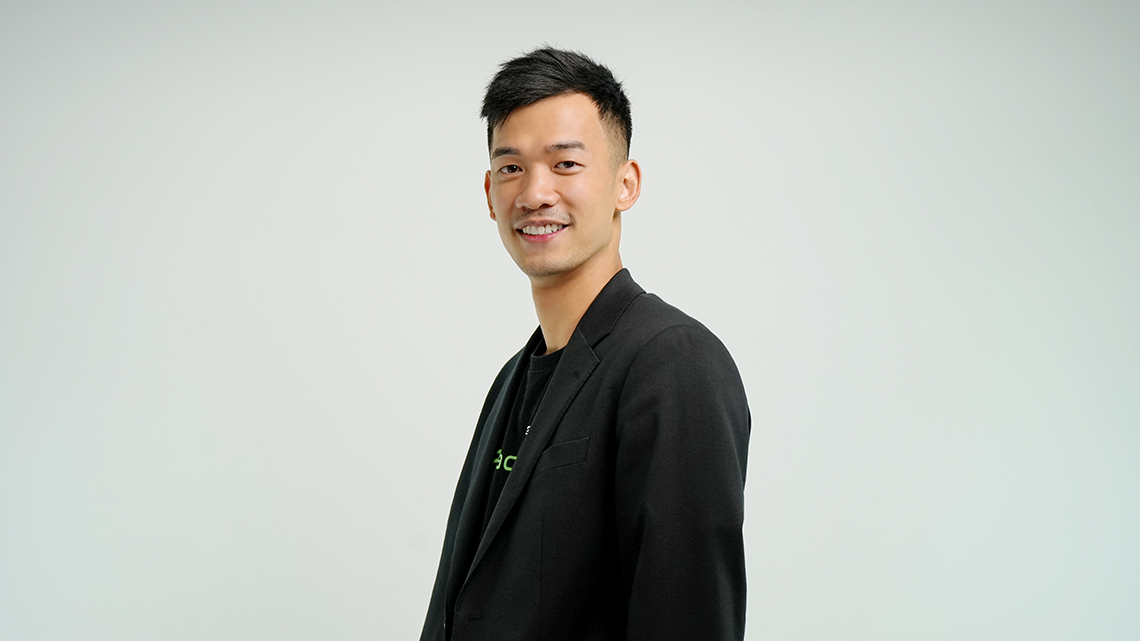
Chris Chou, Co-founder and COO, PackAge+
“I wasn’t the most studious person growing up, but I was always curious about experimenting with different creative outlets—whether it was mixology, street dance, rap, or stand-up comedy.”
This is how Chris Chou, the Co-founder and COO of PackAge+, introduces himself—not with a resume, but with a philosophy. It’s an unusual starting point for an entrepreneur’s story, but it’s the key to understanding his journey. For Chris, entrepreneurship isn’t just about business plans; it’s a creative process of trial and error, a lesson he learned long before he ever launched a company.
From Failure to Foundation
Before he became a purpose-driven co-founder, Chris was a university student with a big idea and little experience. His first venture, a flash-sale e-commerce site, was a chaotic and humbling lesson in what not to do. He describes it as a “playhouse version of starting a business,” fueled more by enthusiasm than by any real knowledge of operations, finance, or even how to structure a team. Naturally, the project didn’t produce any lasting results, and the team eventually dissolved. That so-called failure, however, planted an important seed. It gave him a firsthand taste of what it means to build something from the ground up and taught him that a great idea is nothing without resilience and a deep understanding of business complexities.
After years in the corporate world, Chris felt a magnetic pull to build something of his own. He was drawn not to the latest trend, but to a vast, overlooked problem: the endless waste of single-use packaging from e-commerce. He joined forces with Allen Ye, who founded PackAge+. As an e-commerce seller himself, Allen was inspired by customer complaints about excessive and wasteful packaging. That experience led him to question the status quo in Taiwan, where over 3 billion single-use packages are consumed every year. Allen began the journey as Founder and CEO, and Chris joined later as Co-founder and COO to help scale the company. Founded in 2019, they set out to change a “200-year-old habit of convenience,” building a world where reusable containers become a valuable, not disposable, part of the business model.
The Entrepreneur as a Creative
Chris’s creative passions—from mixology to stand-up comedy—are his business philosophy in disguise. “In mixology, you might create ten failed cocktails before you craft one that truly works. Writing lyrics or jokes is similar—you discard many before finding the one that resonates. Entrepreneurship works the same way: you can make ten wrong decisions, but you still need to have the resilience and mindset to push through and get the eleventh right.”
This iterative mindset is the cornerstone of his leadership. His own leadership style has evolved with each new environment, from consulting to SaaS to his current startup. He notes that while consulting focused on delivering strategic recommendations, and SaaS on aligning teams to concrete goals, a startup’s role is different again. “I’m not just setting direction; I’m also allocating scarce resources, shaping organizational structure, and managing trade-offs that directly influence the company’s survival and growth.” He sees himself as a “chief resource manager” and prioritizes three qualities in his team: strong problem-solving skills, the ability to communicate and integrate resources, and resilience under pressure.
Driving Impact and Scaling a Mission
For Chris, the ultimate purpose of entrepreneurship is to drive long-term value, not just complete a checklist. He believes sustainability is a systems problem, not a solo act. PackAge+ has demonstrated this by building coalitions across the value chain to make the most ethical choice also the easiest one. Their work has not gone unnoticed; PackAge+ has been honored with a Google Accelerator Award in 2023, a Business Startup Award in 2024, and was named one of the Top 100 Startups of Taiwan in 2024.
Chris offers a three-part framework for aspiring founders. First, he emphasizes the importance of thinking about scale from day one. Sustainability is inherently difficult, but founders can engineer for repeatability by creating standard processes, modular products, and securing “lighthouse” customers to validate both ROI and impact. Second, he encourages founders to stay flexible and embrace change. Their own model has pivoted twice, and he advises others to remain adaptable while staying true to the core mission. And third, he recommends that founders lead with vision and persistence to inspire belief from their team, customers, and investors. He reminds them that the core essence of a model cannot be compromised.
Looking ahead, PackAge+ has built a solid foundation in Taiwan, with a market penetration of 0.03% of single-use cartons. Their goal in the next 3–5 years is to scale that to 1% across key sectors. Beyond expansion, they are pushing product innovation to design reusable containers that are “operationally superior to single-use alternatives.” With global momentum accelerating, they are actively pursuing international expansion in regions like Northeast Asia, Southeast Asia, and Europe.
For Chris, the most inspiring part of this journey is seeing how sustainability, technology, and entrepreneurship can come together to create a better world. His story is a powerful reminder that the path to success is paved with persistence, shaped by creativity, and defined by the courage to learn from what doesn’t work.
